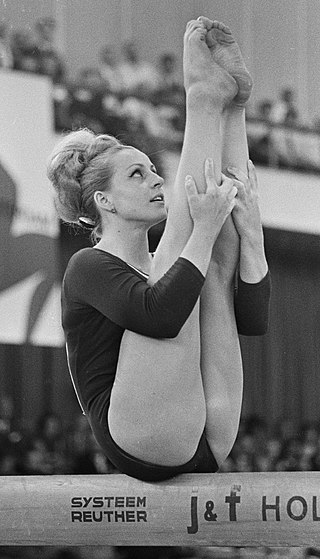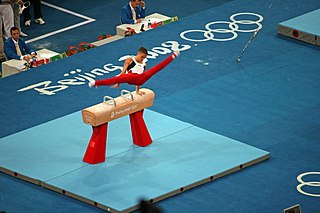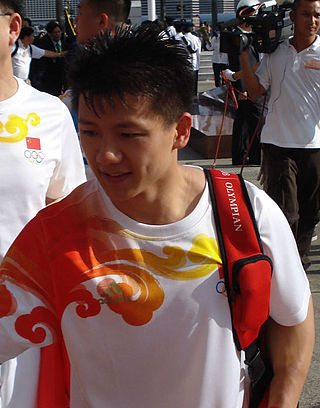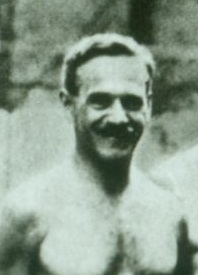
Věra Čáslavská was a Czechoslovak artistic gymnast and Czech sports official. She won a total of 22 international titles between 1959 and 1968 including seven Olympic gold medals, four world titles and eleven European championships. Čáslavská is the most decorated Czech gymnast in history and is one of only two female gymnasts, along with Soviet Larisa Latynina, to win the all-around gold medal at two consecutive Olympics. She remains the only gymnast, male or female, to have won an Olympic gold medal in each individual event.
Artistic gymnastics is a discipline of gymnastics in which athletes perform short routines on different apparatuses. The sport is governed by the Fédération Internationale de Gymnastique (FIG), which designs the Code of Points and regulates all aspects of elite international competition. Within individual countries, gymnastics is regulated by national federations like British Gymnastics and USA Gymnastics. Artistic gymnastics is a popular spectator sport at many competitions, including the Summer Olympic Games.
Hiroyuki Tomita is a Japanese gymnast. Tomita won three Olympic medals at the 2004 and 2008 Olympics.

The men's artistic individual all-around was an artistic gymnastics event held as part of the Gymnastics at the 1912 Summer Olympics programme. The competition was held on 12 July at the Stockholm Olympic Stadium. It was the fourth appearance of the event. There were 44 competitors from 9 nations. Each nation was limited to 6 gymnasts. The event was won by Alberto Braglia of Italy, the first man to successfully defend a title in the artistic individual all-around. The bronze medalist from 1908, Louis Ségura, this time took silver. Braglia and Ségura were the first two men to win multiple medals in the event. Italian Adolfo Tunesi earned bronze.

The men's parallel bars competition was one of eight events for male competitors of the artistic gymnastics discipline contested in the gymnastics at the 2004 Summer Olympics in Athens. The qualification and final rounds took place on August 14 and August 23 at the Olympic Indoor Hall. There were 81 competitors from 31 nations, with nations competing in the team event having up to 5 gymnasts and other nations having up to 2 gymnasts. The event was won by Valeriy Honcharov of Ukraine, the nation's second victory in the parallel bars. Hiroyuki Tomita took silver, putting Japan above the Soviet Union on the all-time medal table for the event. Li Xiaopeng of China became the seventh man to win multiple parallel bars medals with his bronze adding to his 2000 gold.

Vlasta Děkanová was a Czechoslovak artistic gymnast. She was the first World all-around champion in women's artistic gymnastics.

The men's artistic individual all-around competition at the 2008 Summer Olympics was held at the Beijing National Indoor Stadium on August 9 and 14. There were 98 competitors from 35 nations. The event was won by Yang Wei of China, the nation's first victory in the event since 1996 and second overall. Yang, who had earned silver in 2000, was the 13th man to receive multiple medals in the individual all-around. Japan's Kōhei Uchimura took silver; it was the first medal in the event for Japan since 1984, the last of a four-decade stretch where the nation reached the podium every time it competed. Benoît Caranobe of France took bronze, the first men's all-around medal for that nation since 1920.

The men's pommel horse competition at the 2008 Summer Olympics was held on August 17 at the Beijing National Indoor Stadium. The eight competitors with the highest scores in qualifying proceeded to the men's pommel horse finals. There, each gymnast performed again; the scores from the final round determined the final ranking. There were 76 competitors from 27 nations that competed on the pommel horse, with nations in the team event entering up to 5 gymnasts while other nations could enter up to 2. The event was won by Xiao Qin of China, the nation's second consecutive and third overall victory in the pommel horse. The other two medals went to nations that had never earned a medal in the event before: Filip Ude of Croatia took silver while Louis Smith of Great Britain finished with bronze.

The men's rings competition at the 2008 Summer Olympics was held on August 18 at the Beijing National Indoor Stadium. The eight competitors with the highest scores in qualifying proceeded to the men's rings finals. There, each gymnast performed again; the scores from the final round determined final ranking. There were 70 competitors from 25 nations that competed on the rings, with nations in the team event entering up to 5 gymnasts while other nations could enter up to 2. The event was won by Chen Yibing of China, the nation's first victory in the rings since 1984. Yang Wei, also of China, took silver. Bronze went to Oleksandr Vorobiov, the nation's first medal in the event.

The men's parallel bars competition at the 2008 Summer Olympics was held on August 9 and 19 at the Beijing National Indoor Stadium. The eight competitors with the highest scores in qualifying proceeded to the men's parallel bars finals. There, each gymnast performed again; the scores from the final round determined the final ranking. There were 75 competitors from 27 nations that competed on the parallel bars, with nations in the team event entering up to 5 gymnasts while other nations could enter up to 2. The event was won by Li Xiaopeng of China, the first man to win three medals in the parallel bars as well as the first man to win two non-consecutive gold medals in the same apparatus. Yoo Won-Chul of South Korea took silver. Anton Fokin won Uzbekistan's first parallel bars medal in its debut as an independent nation.
Qualifications for Men's artistic gymnastic competitions at the 2008 Summer Olympics was held at the Beijing National Indoor Stadium on August 9. The results of the qualification determined the qualifiers to the finals: 8 teams in the team final, 24 gymnasts in the all-around final, and 8 gymnasts in each of 6 apparatus finals. The competition was divided to 3 subdivisions. The first subdivision took place at 12:00 China Standard Time (UTC+8); the second and third subdivision took place at 16:00 CST and 20:00 CST respectively.

Josef Čada was a Czech gymnast who competed for Bohemia in the 1908 Summer Olympics and for Czechoslovakia in the 1920 Summer Olympics. He made his debut in 1907 at the third World Artistic Gymnastics Championships in Prague, winning gold in the individual all-around competition and the team all-around competition. Čada also competed for Bohemia at 1909, 1911, and 1913 Championships, winning numerous individual and team medals.
The men's team competition was an inaugural event at the World Artistic Gymnastics Championships. It was not held in 1992, 1993, 1996, 2002, 2005, 2009, 2013, 2017, and 2021. In 1994, a separate team championships were held, apart from the individual events championships. This was the only year such a separation was made.
The men's individual all around event was an inaugural event at the Artistic Gymnastics World Championships. It was not held in 1992, 1996, and 2002.
The men's pommel horse competition was an inaugural event at the World Artistic Gymnastics Championships. It was not held in 1909.
Naoya Tsukahara is a former Japanese artistic gymnast and 2004 Olympic Gold Medalist now coaching and competing for Australia. He is the son of the former Japanese gymnast, Mitsuo Tsukahara, who was also a multiple gold medalist in the Olympic Games during the 1960s and 70s. He competed at the 1996, 2000 and 2004 Olympics as well as many World Championships for team Japan from 1996 until 2006. In 2009, he moved to Australia, gaining citizenship in 2012, and currently represents Australia's national gymnastics team, most recently competing at the 2014 Glasgow Commonwealth Games.

František Erben was a gymnast, trainer, and educator from Bohemia, in what is now the Czech Republic. Erben made his international competitive debut at the 1900 Paris Summer Olympics where he finished in 32nd place.

Jan Gajdoš was a Czech gymnast, representing Czechoslovakia. He competed in two Olympic Games and five gymnastics World Championships.
Ivan Alexeyevich Stretovich is a Russian artistic gymnast. He won a silver medal in the team event at the 2016 Summer Olympics.
The Japan men's national artistic gymnastics team is a sport group governed by Japan Gymnastics Association and represents Japan in international gymnastics competitions and multi-sports events. Followed the establishment of All Japan Gymnastics Federation in 1930, the team first appeared at the 1932 Summer Olympics and gradually became the major force till this day. For nearly two decades, from 1960 to 1978, Japanese men was dominant and won every gold medal at the Olympics and World Championships.











